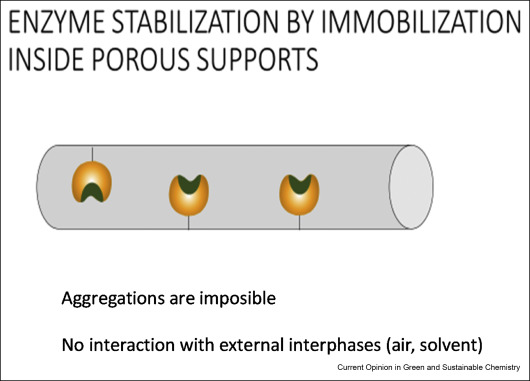CD Biosynsis is a leading expert that dedicated to providing researchers with a wide range of enzyme design services for a long time. Particularly, we focus on enzyme immobilization design strategies to improve enzyme stability, reusability, and ease of isolation. By coating or encapsulating enzymes on solid supports or substrates, we are able to develop powerful biocatalysts for a wide range of applications including biocatalysis, biosensing and bioremediation.
 Fig. 1 Stabilization of enzymes by any kind of immobilization on pre-existing porous supports. (Guisan J.M., et al., 2022)
Fig. 1 Stabilization of enzymes by any kind of immobilization on pre-existing porous supports. (Guisan J.M., et al., 2022)
Our Services
Enzymes play a vital role in various industrial processes due to their high specificity and efficiency. However, a major challenge in utilizing enzymes is their limited stability and recyclability in solution. CD Biosynsis leverages our unique EnzymoGeniusTM technology platform to address these challenges by efficiently, and quickly attaching your enzyme of interest to a solid support or nanoparticles.
An important point is that we utilize advanced artificial intelligence algorithms to screen the best immobilization strategy for the target enzyme and develop an exclusive protocol for you. Through our enzyme immobilization design services, you can solve any challenges. Our enzyme immobilization design services include:
Our service involves attaching enzymes to solid support materials, allowing them to be reused in continuous flow systems. Adsorption, covalent attachment, capture and cross-linking are our common immobilization strategies. This helps you extend the life of your enzymes and enhance the operational stability of your reactor, improving the overall efficiency of the process as well as saving costs and reducing waste generation.
Enzymes are attached to tiny particles, often in the nanoscale range, to enhance their stability, activity and reusability in a variety of industrial applications. in our company, various nanoparticles can be used for enzyme immobilization, including metal nanoparticles (e.g., gold, silver, platinum), metal oxide nanoparticles (e.g., silica, titanium dioxide), magnetic nanoparticles, and carbon-based nanoparticles (e.g., carbon nanotubes, graphene oxide).
Enzyme coatings on solid supports are commonly used in various applications, including biocatalysis, biosensing, and drug delivery. Our company provides several strategies, including physical adsorption, covalent attachment, encapsulation, and layer-by-layer assembly, employed to achieve robust enzyme coatings on solid supports, thus providing stability and robustness to the enzyme, allowing it to function effectively in harsh environments and maintain its activity for an extended period of time.
Service Highlights
- Advanced artificial intelligence databases and computer algorithms analyze proteins of interest to characterize their physical and chemical properties.
- Analyzing the surface of the target enzyme determines the chemical handles and distribution of different residues that can be used for immobilization.
- Computer simulations of enzyme molecular and atomic motion are performed to identify structural changes that may affect the immobilization process.
- A suitable enzyme immobilization strategy can be customized based on the obtained bioinformatics data.
CD Biosynsis aims to use artificial intelligence to provide global customers with a fast and efficient tool to enhance enzyme stability and availability. If you are interested in our services or need more detailed information, please feel free to contact us.
Reference
- Guisan, J.M.; et al. Enzyme immobilization strategies for the design of robust and efficient biocatalysts. Current Opinion in Green and Sustainable Chemistry. 2022, 35: 100593.

































 Fig. 1 Stabilization of enzymes by any kind of immobilization on pre-existing porous supports. (Guisan J.M., et al., 2022)
Fig. 1 Stabilization of enzymes by any kind of immobilization on pre-existing porous supports. (Guisan J.M., et al., 2022)